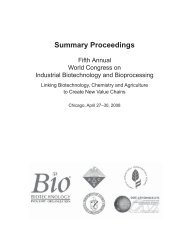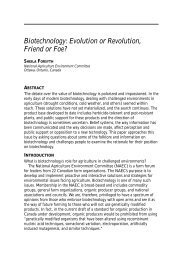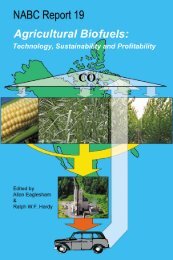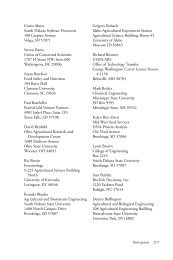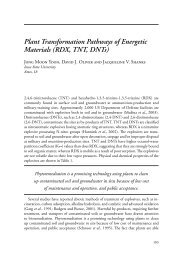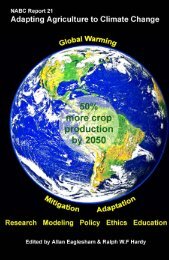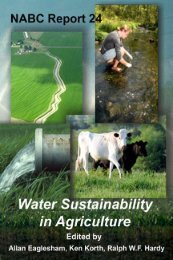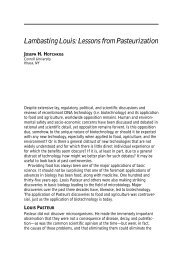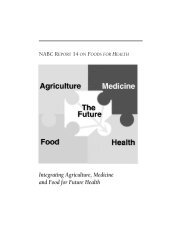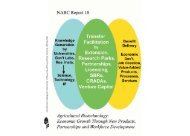Food Security - National Agricultural Biotechnology Council ...
Food Security - National Agricultural Biotechnology Council ...
Food Security - National Agricultural Biotechnology Council ...
- No tags were found...
Create successful ePaper yourself
Turn your PDF publications into a flip-book with our unique Google optimized e-Paper software.
arely have a realistic understanding of careers in law enforcement or homeland security,these internships provide a unique opportunity to experience these environments.ResearchAlmost all plant-pathology research is relevant in some way to agricultural applicationsof microbial forensics and homeland security. However, NIMFFAB faculty and theirpostdocs and students focus their research on initiatives targeted to support the forensicinvestigator’s capabilities in evaluating a criminal case involving plant pathogens or humanpathogens on fresh produce. Most projects involve collaboration and partnershipswith the agencies concerned. Examples of research areas include adaptation of currentor novel plant-disease diagnostic methods for forensic investigation, adapting existinghuman forensic technologies to plant pathogens, and developing new investigative toolsthat facilitate the work of forensic investigators at the scene of a crop-focused crime. Plantpathologists have a unique advantage as developers of field-targeted tools and technologies,in that model systems involving locally common plant pathogens can be readilyfield-tested. Furthermore, data from naturally occurring plant-disease outbreaks can becompared directly to those from outbreaks of the same disease generated in field plots(following all regulatory requirements) by the investigators.OutreachOutstanding training courses and exercises related to crops and plant pathogens are offeredfrequently by the NPDN and APHIS. Such activities are generally targeted towardNPDN plant-disease diagnosticians, APHIS personnel, and local and regional respondercommunities. The training niche that NIMFFAB addresses is designed specifically tobring federal forensic and security investigators into the picture, to provide informationand practice for law enforcement in agricultural crime-scene settings, and to create opportunitiesfor security and law-enforcement personnel to interact with the agriculturalcommunity, including Cooperative Extension educators, crop advisors and farmers.Furthermore, NIMFFAB facilitates interaction between the plant-pathology and law-enforcement/securityagencies by organizing members of the APS—the primary professionalassociation for plant pathologists—interested in these disciplines into interactive groups.The APS Microbial Forensics Interest Group and the APS <strong>Food</strong> Safety Interest Groupmeet yearly during the APS annual meeting, as a forum for prioritizing needs, providingcommunity input, and developing collaborative initiatives in forensic plant pathologyand fresh-produce safety.Final ThoughtsUS preparedness for maintaining the most secure and abundant food supply in the worldhas been improving, but gaps remain. Justifiable concerns about new and emergingpathogens and pests that threaten agricultural resources demonstrate the need for greaterexploration of new and more effective ways of addressing these issues. Greater blendingof disciplines will facilitate the creation of new knowledge, support the development ofnew technologies and capabilities, and allow the broad, cross-disciplinary training thatyoung scientists will need to address these global challenges.156 <strong>Food</strong> <strong>Security</strong>: The Intersection of Sustainability, Safety and Defense



